Cmmb 403 final exam 2024 - Study guides, Class notes & Summaries
Looking for the best study guides, study notes and summaries about Cmmb 403 final exam 2024? On this page you'll find 17 study documents about Cmmb 403 final exam 2024.
Page 2 out of 17 results
Sort by
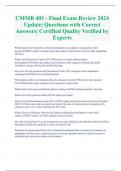
-
CMMB 403 - Final Exam Review 2024 Update| Questions with Correct Answers| Certified Quality Verified by Experts
- Exam (elaborations) • 43 pages • 2024
- Available in package deal
-
- $13.99
- + learn more
CMMB 403 - Final Exam Review 2024 Update| Questions with Correct Answers| Certified Quality Verified by Experts Which animal's development is chick development most similar to compared to other species?Most similar to humans than other species talked about in lecture (like amphibians and flies) What is the Nieuwkoop Centre (NC)? When does it emerge during embryo development?Centre that induces the formation of the organizer and later the dorsal mesoderm; emerges during the late ...
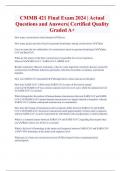
-
CMMB Bundled Exams Questions and Answers 100% Verified by Expert 2024
- Package deal • 9 items • 2024
-
- $27.99
- + learn more
CMMB 421 Final Exam 2024 | Actual Questions and Answers| Certified Quality Graded A+ 2 Exam (elaborations) CMMB 413 Final Exam Review 2024 Update| Questions with Complete Solutions| Certified Quality Guaranteed Success 3 Exam (elaborations) CMMB 403 final Exam New Year 2024| Questions and Answers| Certified Quality Graded A+ 4 Exam (elaborations
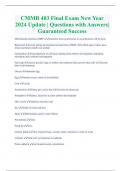
-
CMMB 403 Final Exam New Year 2024 Update | Questions with Answers| Guaranteed Success
- Exam (elaborations) • 7 pages • 2024
- Available in package deal
-
- $10.49
- + learn more
CMMB 403 Final Exam New Year 2024 Update | Questions with Answers| Guaranteed Success Mid-blastula transition (MBT) transition from synchronous to asynchronous cell division Blastocoel cavity during development around time of MBT, fluid-filled space; future anus (frog) and future mouth (sea urchin) Gastrulation rearrangement of cell layers during early embryo development; endoderm, mesoderm and ectoderm rearrangment Fate map used at specific stage of embryo development that can tell w...
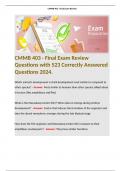
-
CMMB 403 - Final Exam Review Questions with 523 Correctly Answered Questions 2024.
- Exam (elaborations) • 86 pages • 2024
-
- $9.59
- + learn more
CMMB 403 - Final Exam Review Questions with 523 Correctly Answered Questions 2024. Terms like; Which animal's development is chick development most similar to compared to other species? - Answer: Most similar to humans than other species talked about in lecture (like amphibians and flies)
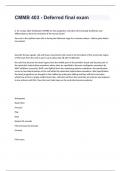
-
CMMB 403 - Deferred final exam Questions with complete solution 2024
- Exam (elaborations) • 4 pages • 2024
- Available in package deal
-
- $13.99
- + learn more
CMMB 403 - Deferred final exam Questions with complete solution 2024 A. At 13 days after fertilization WHERE are the progenitor cells that will eventually proliferate and differentiate to form the ventricles of the human heart? they are in the epiblast since this is during the bilaminar stage for a human embryo - before gastrulation has started. describe the key signals, cell and tissue movements that result in the formation of the ventricular region of the heart from the cells in part A u...
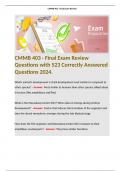
-
CMMB 403 - Final Exam Review Questions with 523 Correctly Answered Questions 2024. Terms like; Which animal's development is chick development most similar to compared to other species? - Answer: Most similar to humans than other species talked about i
- Exam (elaborations) • 86 pages • 2024
-
- $8.99
- + learn more
CMMB 403 - Final Exam Review Questions with 523 Correctly Answered Questions 2024. Terms like; Which animal's development is chick development most similar to compared to other species? - Answer: Most similar to humans than other species talked about in lecture (like amphibians and flies)
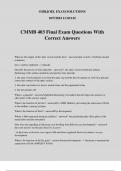
-
CMMB 403 Final Exam Questions With Correct Answer
- Exam (elaborations) • 37 pages • 2024
-
- $11.49
- + learn more
CMMB 403 Final Exam Questions With Correct Answers What are the origins of the optic vesicle and the lens? - answeroptic vesicle = forebrain (neural ectoderm) lens = surface epidermis --> placode Describe the process of lens induction - answer1. the optic vesicle (forebrain) induces thickening of the surface epidermis (prospective lens placode) 2. the optic vesicle pinches in to form the optic cup and the lens invaginate as well (lens placode comes into contact w/ the optic vesicle) ...

Study stress? For sellers on Stuvia, these are actually golden times. KA-CHING! Earn from your study resources too and start uploading now. Discover all about earning on Stuvia


